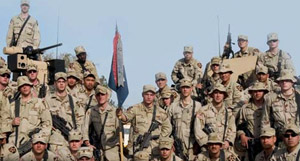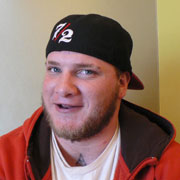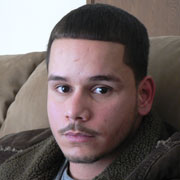Originally aired May 18, 2010
A powerful portrait of what multiple tours and combat injuries -- visible and invisible -- are doing to a generation of young American soldiers.

Three stories from FRONTLINE’s The Wounded Platoon
Several years after their tours in Iraq, these soldiers still live with debilitating symptoms from their brain injuries
by Dan Edge, director and co-producer (September 2010)
David Nash | Kenny Eastridge |
Jose Barco |
No one saw the car until it was too late. It swerved, went airborne and exploded. Jose Barco, the youngest member of his platoon, was flung through the air and smashed into a wall. All he remembers is a flash of white light. His fellow soldiers remember him in flames. It was Veterans Day 2004, in the heart of the Sunni Triangle, and the Iraqi insurgency was about to kick off.
Five years later, Barco sits in a small cell in El Paso County Jail, awaiting sentencing for a drive-by shooting in Colorado Springs, Colorado.
The passage of time -- and expert treatment by military doctors -- have more or less healed Barco's visible wounds. But he's also been diagnosed with other, invisible injuries: post-traumatic stress disorder [PTSD] and traumatic brain injury [TBI].
TBI is a condition now thought to afflict hundreds of thousands of U.S. soldiers returning from Iraq and Afghanistan since 2002. It ranges from mild to severe. In its extreme manifestations TBI can leave soldiers almost incapable of functioning. Even a mild TBI [mTBI] -- a concussion -- can leave soldiers with a range of debilitating symptoms: headaches, balance problems, hearing problems, lack of self-control, and most commonly, memory loss. While a lot recover from mTBI, it can take months, even years.
Barco's memory is shot to pieces. He struggles to remember the names of everyday objects, or his time as a soldier. More than once, he sighs and says: "To tell you the truth, it's all a blur to me. It's like it was a dream."
Barco isn't the only soldier in his platoon -- the 2004-2005 class of Third Platoon, Charlie Company, 1st Battalion, 506th Regiment, 2nd Infantry Division -- still battling the effects of their two tours in Iraq. My co-producer Christopher Buchanan and I pieced together the stories of these men in our May 2010 FRONTLINE report, The Wounded Platoon. What was disturbing was that so many of them struggled to adjust to life back home. Four have served time in prison since coming home -- three on murder or attempted murder charges. More than half told us they suffered from serious psychological problems. Hardly any have managed to maintain relationships that started before the war. There has been at least one suicide attempt. Almost all admit to having had a drinking or drug problem at some point. Some have faced their demons and moved forwards in their lives. Others continue to suffer.
But what was significant was that more than half the soldiers of Third Platoon suffered a traumatic brain injury in Iraq. And for many of them, the effort to diagnose and treat these brain traumas was inadequate.
Soldiers experienced concussions -- a brain trauma -- but never reported them, fearful they'd be taken off duty and thought of as weak. Brain traumas were missed and never diagnosed by stressed army medics on the battlefield. Some soldiers were diagnosed with brain injury, but their records were lost in the field, making it hard for them to get any treatment when they came home. All of those who were eventually treated by military doctors for their head injuries complained to us that they were only treated with psychotropic drugs rather than any kind of rehabilitative therapy.
Here are three stories from The Wounded Platoon:

He was Third Platoon's second youngest soldier. Dismissed from the army after failing a drug test in 2005, he's drifting from state to state, blowing his earnings as a welder on all-night poker sessions and marijuana. His Other than Honorable [OTH] discharge means he's ineligible for medical treatment from the Veterans Administration [VA].
When I first met Nash in September 2009, he was unclear about whether he had suffered a traumatic brain injury in Iraq. He certainly had the symptoms of a mild TBI: memory loss, headaches, angry outbursts. But all these problems could equally be ascribed to his history of drug abuse. He couldn't remember whether medics at Fort Carson had diagnosed him with any brain trauma.
It was only after Nash gave us permission to access his military medical records that we discovered he had indeed suffered a head injury in Iraq -- and we began to suspect that his subsequent drug problems might be connected to it.
Nash had escaped unscathed from the explosion that injured Jose Barco and killed one of the platoon's sergeants. But just 24 hours later, Nash's Humvee drove over an IED [improvised explosive device]. He was knocked unconscious. Minutes later, as Nash and his squad checked themselves, a firefight broke out which went on for several hours. By the time he got back to base, Nash says he was buzzing with adrenaline and just wanted to sit with his fellow soldiers and talk about the battle they had just survived. He didn't report the explosion or his loss of consciousness. In a military questionnaire he completed a year later, Nash wrote that he didn't seek treatment at the time because "others were worse and my team needed me."
It wasn't until nine months after the blast, after returning to Fort Carson, that Nash started to suffer from chronic headaches, depression, memory loss and anxiety -- all symptoms connected with mild TBI, or a concussion . His medical records show that he was referred to a neurologist at Peterson Airforce Base, who prescribed him painkillers and antidepressants for dealing with the symptoms -- and no further treatment.
Nash found that the medications he was prescribed didn't help his headaches or anxiety. He turned to cocaine and marijuana. When he then failed a drug test, he was kicked out of the army with no medical benefits at all. He still suffers from chronic headaches, still smokes marijuana on a daily basis, but he says he's managed to quit cocaine.
Two days after The Wounded Platoon was broadcast, the VA told David Nash that his discharge was being upgraded from OTH to General -- meaning he is now eligible for full medical care for his traumatic brain injury.

The failure to diagnose and treat Nash's brain injury is at least partially explained by his own failure to report the incident when it occurred. The same can't be said of Kenny Eastridge.
On Feb. 11, 2005, Eastridge's Humvee drove over a double-stacked anti-tank mine. Eastridge says he was blown from his position in the gun turret and landed unconscious some distance from the vehicle. He was rushed to a field hospital in Iraq, where a leg injury was patched up and he was told he had a "probable" traumatic brain injury.
The next day, back on base, his friends in Third Platoon noticed a clear liquid leaking from his ears. The company medic told him it was "probably cerebral fluid." Eastridge says in spite of this news, he had no further treatment: "I was never taken back to the hospital. … They just brought me back and when my leg healed, they put me back out on missions. I never went back to the hospital again. I probably should have been sent out of the country; it was pretty severe looking back on it, because it still hasn't healed and it's been years. I'm still having headaches and memory problems."
Eastridge's medical records from his first tour in Iraq have been lost and there is no way of checking his version of his treatment, or lack of it, against the army's own records -- although other members of Third Platoon have confirmed his account of the IED and of the clear fluid leaking from his ears. The loss of the medical records meant that once Eastridge came home, there was no record of him having suffered a TBI in Iraq. At Fort Carson, in Colorado Springs, he received no treatment for his brain injury.
Eastridge went on to serve another combat tour, and was exposed to several bomb blasts. He is now serving 10 years in prison for his role in a string of crimes in Colorado Springs in 2008, including the violent assault of a teenage girl and the murder of a fellow soldier.
Some psychiatrists, controversially, have tried to link the criminal behavior of returning soldiers like Eastridge to their traumatic brain injuries. Brig. Gen. Stephen Xenakis, M.D. (Ret.), a former top military psychiatrist who until recently was a consultant to the Joint Chiefs of Staff, told us: "[TBI ]most sensitively affects executive functioning, that part of the brain that we use for judgment and we use for decision making … when we are in situations of intense emotion. So if a person is affected neurologically … they don't have the controls that they had before. … They can't think as clearly. …They are really vulnerable to just reacting, overreacting, particularly maybe doing something that they had done when they'd been in combat."
Others we spoke to in the military mental health care system are wary of trying to draw a link between TBI and crime. Dr. Heidi Terrio, Chief of Deployment Health at Fort Carson, told us: "Folks that go to war have a certain desensitization to death and dying. But we've seen a lot of folks go to war that have not committed murders. So whether or not you have PTSD or traumatic brain injury, you still know right from wrong."

When we first filmed with young Third Platoon gunner Jose Barco, he was in jail awaiting sentencing for a drive-by shooting in Colorado Springs. He knew his attorney was planning to use his PTSD and TBI diagnoses to try to persuade the judge to show leniency, but he thought it was the wrong tactic. Barco was worried that the fact that he suffered from a brain injury would actually count against him, because people would think he was dangerous and needed to be kept off the streets. Because of this, Barco refused to go into detail with our team about his TBI and PTSD, and forbade us from seeing his medical records.
In the event, Barco was sentenced to 52 years for the shooting, which had left a pregnant woman with a serious leg injury. The judge made it clear that Barco's military background was not a mitigating factor in the sentence. If anything, the judge argued, the fact that he served in the army made the crime worse.
After our report was broadcast in May 2010, Barco was inundated with offers of legal help and medical treatment. When I got in touch with him again in August, he agreed to hand over his medical records.
When all 200 pages of them arrived, it became clear that Barco was one of the most wounded soldiers of The Wounded Platoon. One record from April 2008 -- two weeks before the shooting incident in Colorado Springs -- listed more than 20 separate diagnoses of physical and mental health problems, including post-concussion syndrome [a set of symptoms associated with TBI], post-traumatic stress disorder, insomnia related to a mental disorder and burns.
Using Barco's records, we were able to piece together a chronology of his brain injuries and the treatment he received for them.
On the day of his original injury, Nov. 11, 2004, Barco was unconscious for several minutes. But in the chaos and confusion of the lethal blast, army field medics missed his injury. The trauma evaluation and treatment note from the day details a laceration to his lip, first degree burns to his thigh and second degree burns to his hand. There is no record of a loss of consciousness or suspected brain injury in his notes. As a result, when he was evacuated to the U.S., Barco received no treatment for TBI. Instead, he was sent to Brooke Army Medical Center in Texas, where he received what he called "excellent" treatment for his burns.
It wasn't until over a year later, when Barco noticed a ringing in his ears, that military doctors realized he had a head injury. His records show that Fort Carson doctors connected his hearing problems to a "closed head injury" suffered in the November 2004 explosion. Barco was told that his burns and hearing loss qualified him for an honorable medical retirement from the army, which would leave him with a lifelong pension and free healthcare with the VA.
But Barco wanted to go back to Iraq. He started pestering his doctors to declare him fit for duty. There is evidence that some of his health care providers were not at all convinced he should return to combat. By July 2006, Barco's records show he was suffering from nightmares and sleeplessness. A psychiatric nurse wrote on his notes, "[I] believe there are a number of issues going on with this gentleman but he does not want to be labeled as 'crazy.' … Reports LOC [loss of consciousness] after IED explosion may need neuropsych evaluation, please evaluate and treat."
Despite this, Barco persuaded his doctors to cancel his medical retirement process and declare him fit for duty. As he told us, "You know, if somebody wants to go they're going to let them go. Unless he's like paralyzed or something like that. They need people."
Barco returned to Iraq in fall 2006.
The horrors of Third Platoon's second tour of Iraq, during the so-called surge, became the eventual focus of our film. In the fog of war, several of the soldiers in the unit unraveled under the pressure of intense combat, heavy casualties, and drug and alcohol abuse. Morale was low. Some of the soldiers lost their moral compass. Our documentary uncovered shocking allegations that members of the platoon casually murdered Iraqi civilians. Barco himself confessed to us on camera that he deliberately killed unarmed Iraqis on more than one occasion.
By the time Barco came home again, in December 2007, his TBI symptoms had worsened after exposure to more bomb blasts in Iraq. In a questionnaire he completed just a week after coming home, he told doctors he often felt dazed and confused, had memory problems, was unable to concentrate and was experiencing ringing in his ears and sleep problems. He was diagnosed with further mild traumatic brain injury. His medical records show that he was referred to Fort Carson's TBI clinic.
Barco's treatment consisted entirely of psychotropic drugs. He was initially prescribed Ambien to help him sleep. The abuse of Ambien by soldiers, and its potentially dangerous side effects, are issues we explored in our report. He was then prescribed Tylenol, a painkiller, and Buspar, a psychoactive anti-anxiety drug. In experimental trials with rodents, Buspar has been shown to improve spatial learning and memory after TBI -- but as yet there is no evidence it does the same for humans. Barco says it didn't help him cope with his TBI symptoms at all. In fact, he says the reliance on medication left him feeling abandoned by the military.
Stephen Xenakis thinks the military overrelies on medication for treatment of TBI: "Many of [the soldiers] don't like the medication: It's not what they need, and in some ways it doesn't make them feel like themselves." David Nash, who was also medicated for his TBI symptoms, agrees with him: "That's all they'll do. They'll shove pills down your mouth. They think that makes everything better."
Two weeks after he started a new course of medications, in April 2008, Barco drove past a house party in Colorado Springs and fired six bullets at group of teenagers standing in the porch. One bullet hit a pregnant woman in the leg. He claims he has no memory of what happened that night.
Undiagnosed or inadequately treated traumatic brain injuries do not in themselves explain the troubled homecomings of the soldiers of Third Platoon, nor do they explain or excuse the horrific crimes some of them committed. But when they are added to an already toxic brew of other factors -- untreated post-traumatic stress disorder, abuse of illegal or prescription drugs, repeated tours with not enough dwell time in between, criminal histories and psychological problems prior to enlistment, and a culture of casual killing fostered in a chaotic war zone -- it is perhaps not surprising that some terrible things happened when Third Platoon came home.
At the time of writing, both Kenny Eastridge and Jose Barco are in prison in Colorado and receiving no treatment for their TBI or any of their other combat-related injuries. Eastridge will be eligible for parole in 2012, but his OTH discharge means he is disqualified from VA medical treatment.
COMMENTS
blog comments powered by DisqusIn order to foster a civil and literate discussion that respects all participants, FRONTLINE has the following guidelines for commentary. By submitting comments here, you are consenting to these rules:
Readers' comments that include profanity, obscenity, personal attacks, harassment, or are defamatory, sexist, racist, violate a third party's right to privacy, or are otherwise inappropriate, will be removed. Entries that are unsigned or are "signed" by someone other than the actual author will be removed. We reserve the right to not post comments that are more than 400 words. We will take steps to block users who repeatedly violate our commenting rules, terms of use, or privacy policies. You are fully responsible for your comments.